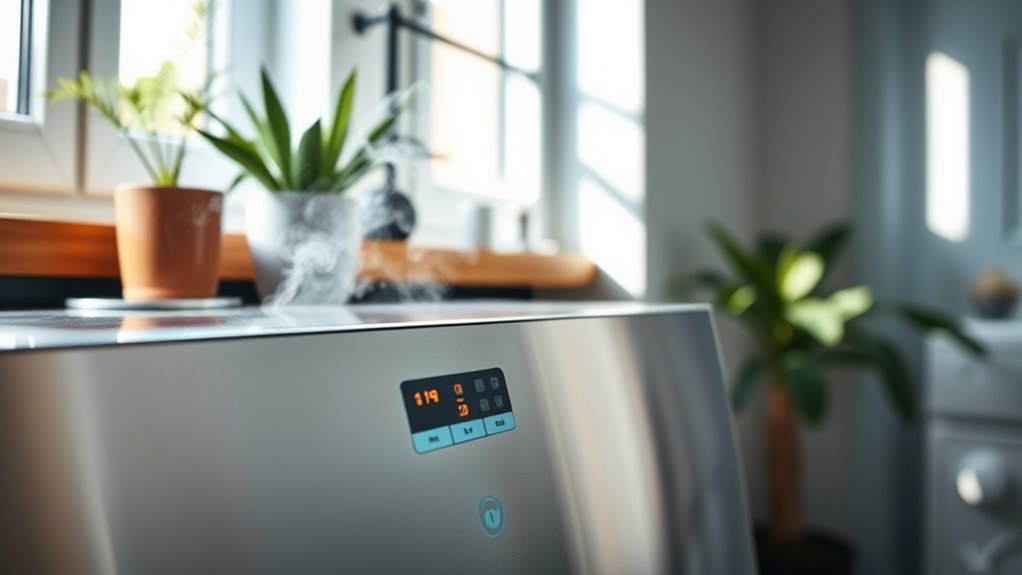Condensing boilers are the cheapest to run due to their enhanced energy efficiency. They recycle exhaust gases to preheat incoming water, greatly reducing energy waste. This innovation leads to lower utility bills compared to traditional models. Choosing the right fuel type also affects running costs, with natural gas generally being the most economical option. Regular maintenance further optimizes efficiency. Want to explore more about different boiler types and tips for maximizing savings? Keep going for more insights!
Key insights
- Combi boilers are often cheaper to run due to their compact design and efficiency in providing instant hot water without storing it.
- Condensing boilers maximize energy extraction from exhaust gases, resulting in lower utility bills compared to traditional boilers.
- Natural gas boilers are typically the most economical option, offering lower costs per unit than oil or electric alternatives.
- Regular maintenance significantly enhances boiler efficiency, reducing energy consumption and long-term running costs.
- Evaluating local fuel prices is crucial, as variations can greatly affect the overall cost-effectiveness of different boiler types.
Understanding Boiler Efficiency Ratings

Boiler efficiency ratings are essential for selecting a cost-effective heating system. When you evaluate boiler performance, you're looking at how effectively the system converts fuel into heat. Higher efficiency ratings often indicate better fuel usage, which can lead to significant cost savings over time.
You should consider the Annual Fuel Utilization Efficiency (AFUE) rating, as it directly impacts your energy bills. A boiler with a higher AFUE percentage indicates more efficient operation, meaning less fuel consumption for the same heat output.
Efficiency improvements can also be made through proper maintenance, such as regular cleaning and inspections. By understanding these ratings and their implications, you can make informed decisions that enhance your boiler's performance and reduce running costs. Regular commercial boiler service ensures optimal efficiency and longevity of your heating system.
Comparing Different Types of Boilers
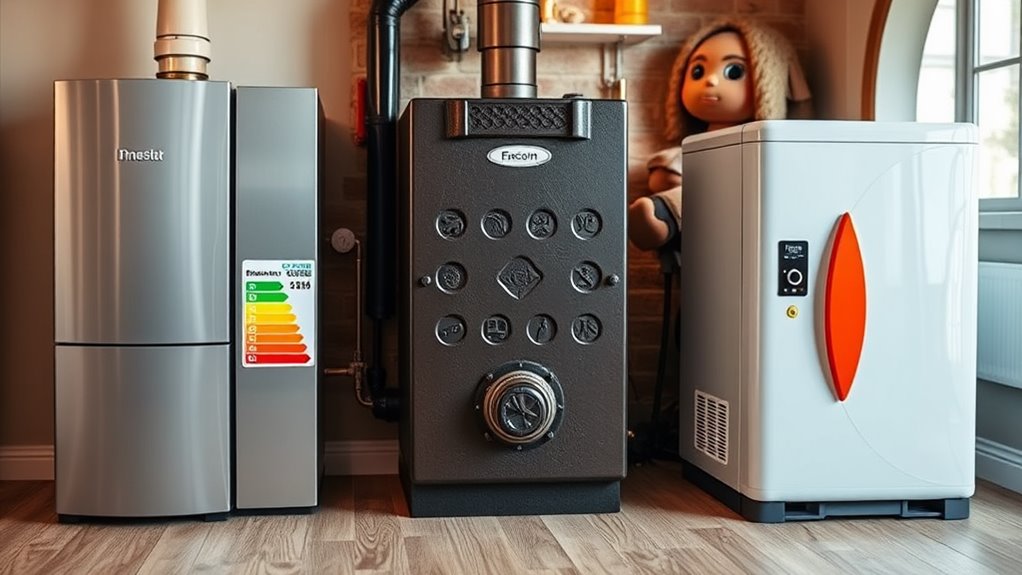
When comparing different types of boilers, it is crucial to take into account their operational characteristics and how they align with your heating needs. You'll typically encounter combi, system, and regular boilers, each with distinct advantages. Combi boilers are compact and provide instant hot water, ideal for smaller spaces. System boilers store hot water, making them suitable for larger households. Regular boilers work with a separate hot water tank, offering consistency but requiring more space.
For a thorough cost analysis, consider both installation and running costs. While combi boilers may have lower upfront expenses, system and regular boilers often provide better efficiency in larger homes. Regular maintenance of your boiler will also play a significant role in optimizing its efficiency and reducing long-term costs. Evaluating these factors will help you make an informed decision tailored to your specific requirements.
The Benefits of Condensing Boilers
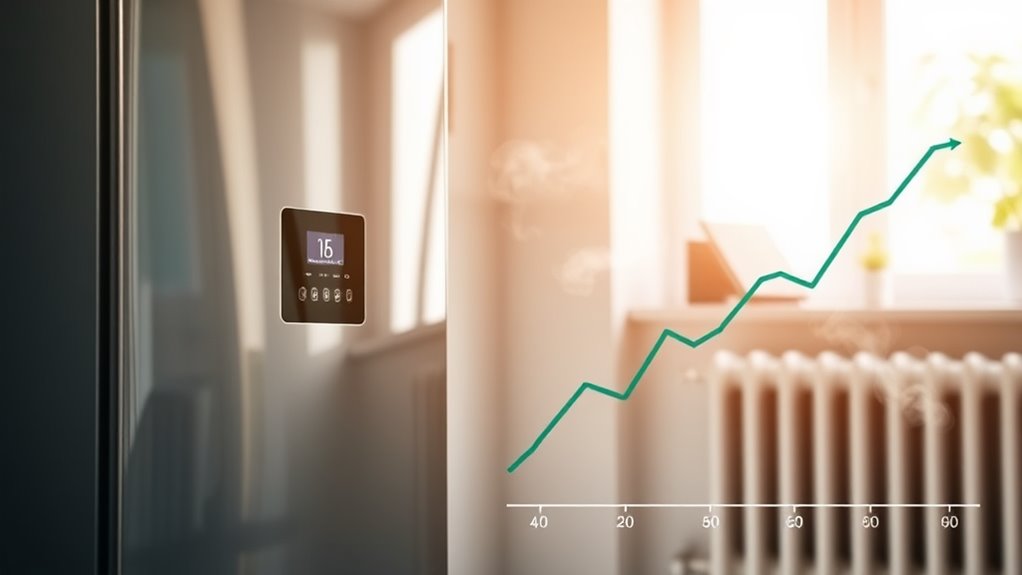
Condensing boilers offer enhanced energy efficiency by utilizing exhaust gases to preheat incoming water, which considerably reduces energy waste. As a result, you'll notice lower operating costs compared to traditional boilers. Investing in a condensing boiler can lead to substantial savings on your utility bills over time. Additionally, these systems can provide energy-efficient heating solutions that contribute to a lower carbon footprint.
Enhanced Energy Efficiency
As you explore options for efficient heating solutions, you'll find that condensing boilers stand out due to their enhanced energy efficiency. These systems utilize advanced energy saving technologies, capturing and reusing exhaust heat that traditional boilers would release. By optimizing insulation, condensing boilers reduce heat loss, ensuring more of the generated heat remains in your home. This process not only lowers energy consumption but also increases your heating system's overall performance. Additionally, condensing boilers are designed to operate at lower temperatures, further improving efficiency. If you're looking to minimize your environmental footprint while maximizing comfort, investing in a condensing boiler can be a smart choice for your heating needs. Regular maintenance helps prevent error codes and enhances boiler longevity, ensuring optimal performance throughout its lifespan.
Lower Operating Costs
With enhanced energy efficiency comes the potential for considerably lower operating costs. Condensing boilers utilize advanced technology to maximize energy extraction, greatly reducing your fuel consumption. This efficiency translates into lower monthly bills, making them a cost-effective choice. Additionally, these systems typically require lower maintenance compared to traditional boilers. Fewer mechanical parts and more reliable operation mean you'll spend less on repairs and servicing. To further optimize your system's performance, consider conducting regular energy audits. These audits help identify inefficiencies, ensuring your condensing boiler operates at peak performance. By investing in a condensing boiler, you not only save money on energy bills but also enjoy the peace of mind that comes with reduced maintenance and increased efficiency. Moreover, implementing energy-efficient heating systems can significantly lower your carbon footprint and operational costs.
Understanding Fuel Types and Costs
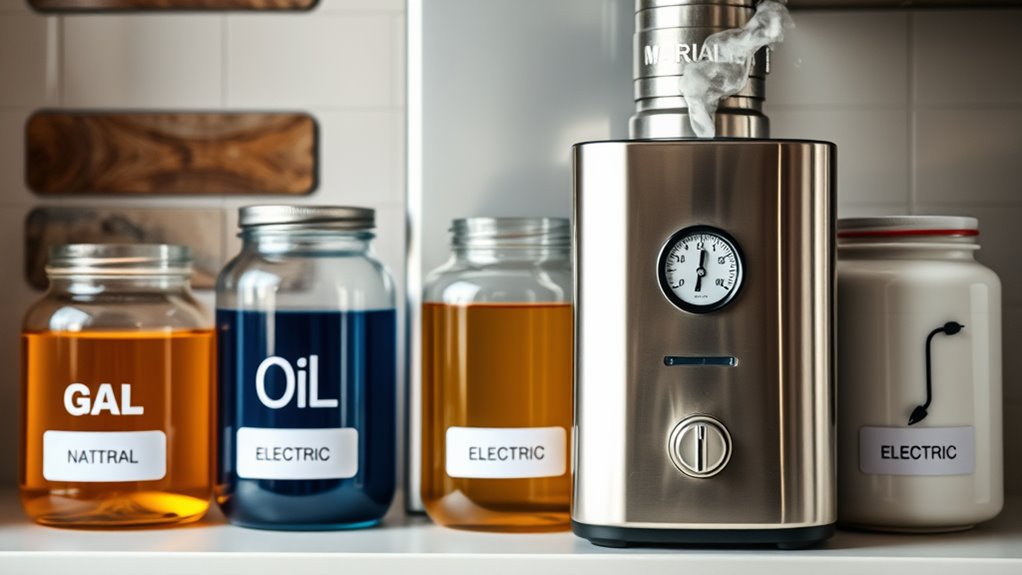
When choosing a boiler, understanding the various fuel types is essential for evaluating your operating costs. Each fuel type—whether it's natural gas, oil, or electricity—has distinct efficiency rates and price points that can impact your overall expenses. By comparing these factors, you can make an informed decision that aligns with your budget and heating needs. Additionally, it's crucial to consider the importance of obtaining a Commercial Gas Safety Certificate to ensure the safety and compliance of gas appliances, which can also affect long-term running costs.
Fuel Type Comparison
Choosing the right fuel type for your boiler can considerably impact your overall heating costs and efficiency. Natural gas is often the most economical option, typically providing lower costs per unit compared to fuel oil. Its widespread availability and cleaner combustion make it a popular choice for homeowners. Fuel oil, while sometimes more expensive, can be beneficial in areas without natural gas access. However, it usually involves higher storage and maintenance costs. Additionally, fuel oil systems tend to emit more pollutants, which may be a concern for environmentally conscious users. Evaluating your local fuel prices and considering installation requirements will help you make the best decision for your heating needs. Regular maintenance of HVAC systems is also crucial for optimizing efficiency and reducing costs.
Operating Cost Analysis
The fuel type you select greatly influences your boiler's operating costs, making it important to analyze these expenses closely. Natural gas, for instance, typically offers lower operating expenses compared to oil or electric boilers. When considering fuel prices, keep in mind that market fluctuations can impact long-term costs. Additionally, efficiency ratings play a significant role—higher efficiency means lower fuel consumption and, as a result, reduced operating costs. To implement effective cost-saving strategies, consider regular maintenance to keep your boiler running at peak performance. This guarantees you maximize efficiency and minimize unnecessary expenses. By understanding the relationship between fuel types and operating expenses, you can make informed decisions that contribute to long-term savings and improved energy efficiency in your home. Regular maintenance also helps prevent issues such as low water pressure that can lead to costly repairs or inefficiencies.
Factors Affecting Boiler Running Costs
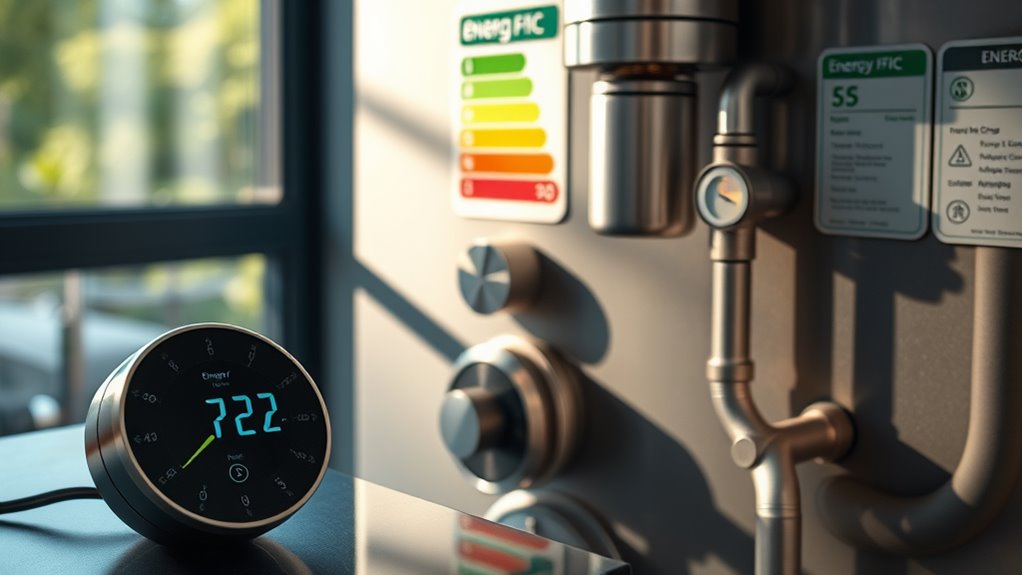
Although various factors influence boiler running costs, key elements include boiler efficiency, fuel type, maintenance frequency, and system design. A highly efficient boiler reduces energy consumption, leading to lower utility bills. The type of fuel you choose—natural gas, oil, or electricity—also greatly impacts costs; some fuels are cheaper than others. Regular boiler maintenance is essential, as neglect can lead to inefficient operation and increased energy consumption. Additionally, the design of your heating system affects how effectively it distributes heat, influencing overall efficiency. By understanding these factors, you can make informed decisions to enhance boiler performance and minimize running costs, ultimately saving you money and ensuring consistent heating. Furthermore, routine preventative maintenance can significantly improve boiler efficiency and longevity.
How to Calculate Your Boiler's Efficiency
Understanding how to calculate your boiler's efficiency can greatly impact your energy costs. To determine efficiency, follow these steps:
- Measure the fuel input and output using a gas meter or fuel gauge.
- Calculate the energy produced by the boiler during a specific time frame.
- Divide the energy output by the energy input and multiply by 100 to get a percentage.
- Regularly conduct energy audits and maintain your boiler to guarantee peak performance. Additionally, regular maintenance helps prevent issues, ensuring that your boiler operates efficiently.
Tips for Reducing Heating Bills
To effectively reduce your heating bills, focus on a combination of practical strategies and regular maintenance. Start by ensuring your boiler is well-maintained; schedule annual inspections to optimize its efficiency. Implement energy saving tips like sealing drafts in windows and doors, which prevents heat loss. Consider investing in a programmable thermostat to automate your heating schedule, aligning it with your daily routine. Also, regularly bleed radiators to enhance heating optimization by ensuring hot water circulates efficiently. Insulating pipes and increasing insulation in your home can markedly decrease energy consumption. Finally, consider upgrading to a more efficient boiler model, as newer technologies often provide better performance and lower operational costs. These steps can lead to substantial savings over time.
Frequently Asked Questions
How Long Do Different Boiler Types Typically Last?
Different boiler types typically have varying lifespans. For instance, a conventional boiler lasts around 15-20 years, while a combi boiler might last 10-15 years. To maximize your boiler lifespan, implement regular maintenance tips like annual servicing, checking for leaks, and flushing the system. Keeping components clean and ensuring proper installation also play essential roles in extending the life of your boiler, ensuring it operates efficiently and reliably for years to come.
Are There Government Incentives for Energy-Efficient Boilers?
Yes, there are government incentives for energy-efficient boilers. Many governments offer rebates to encourage homeowners to upgrade to more energy-efficient systems. These rebates can greatly reduce your initial costs, making it more affordable to invest in a high-efficiency boiler. By taking advantage of these programs, you not only enhance your home's energy efficiency but also lower your long-term energy bills, providing a more sustainable and cost-effective heating solution.
What Are the Maintenance Costs for Various Boiler Types?
When it comes to maintenance costs, boiler servicing is essential for keeping your system efficient. Generally, you can expect annual servicing fees to range from $100 to $300, depending on the boiler type. Repair frequency varies; older models might need more frequent repairs, increasing your overall costs. In contrast, modern, energy-efficient boilers usually require less maintenance and can save you money in the long run, both on servicing and energy bills.
Do Boiler Brands Affect Running Costs Significantly?
Yes, boiler brands can greatly affect running costs. Well-established brands often have better brand reputation and invest in energy-efficient technology, leading to lower fuel consumption. When you choose a reputable brand, you're likely to benefit from advanced features that enhance efficiency and reliability. Cheaper brands might save you money upfront, but they can lead to higher running costs and maintenance issues in the long run. Always consider brand reputation when selecting your boiler.
How Do Climate and Location Impact Boiler Efficiency?
Climate and location play essential roles in boiler efficiency. In colder climate zones, your boiler works harder, increasing fuel consumption and running costs. Conversely, in milder areas, you'll notice improved efficiency and lower costs. Location variations, such as altitude and humidity, also affect performance; boilers may struggle in high-altitude areas due to thinner air. Choosing a boiler suited to your specific climate can optimize efficiency and help you save on energy bills.
Summary
In conclusion, choosing the cheapest boiler to run involves understanding efficiency ratings, fuel types, and specific costs in your area. Condensing boilers typically offer the best efficiency, but it's crucial to evaluate your unique needs and home setup. By calculating your boiler's efficiency and exploring ways to reduce heating bills, you can make informed decisions that lead to significant savings. Ultimately, investing in the right boiler can enhance comfort while minimizing energy expenses.

